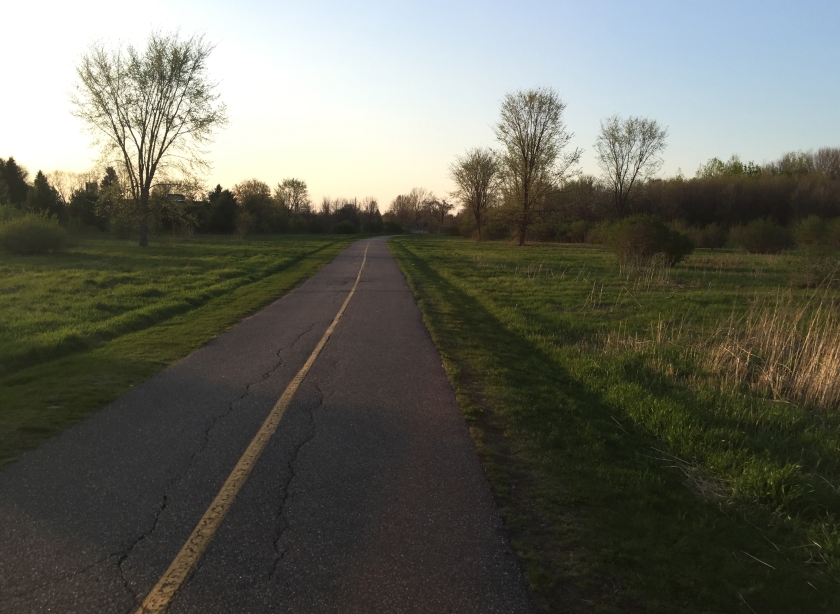A while ago I joined a walking tour of Parliament Hill with Jaime Koebel. Jaime runs Indigenous Walks which she describes as, ‘A guided walk & talk through downtown Ottawa that presents participants with social, political, cultural & artistic spaces from an Indigenous perspective‘. As we looked out across the Ottawa (or Kitchissippi) River towards the Museum of History, Jaime mentioned the totem poles displayed within the museum, as well as a number of others carved by indigenous sculptors located outdoors within the area. Here’s a 33km loop that visits those sites. This bike tour is almost entirely along NCC multi-use paths.
UPDATE 2018: I’ve added an optional detour to Rideau Hall where stands another totem pole (see purple line on map). More on this piece further down in the post.
.
Our ride begins near the eastern tip of Victoria Island where stands this totem pole sculpted by Walter Harris of the Gitxsan First Nation in northern British Columbia.

I rode west and accessed the Ottawa River Pathway behind the War Museum, and followed it along the river to where it connects to the Pinecrest Creek Pathway.

I rode the length of the Pinecrest Creek Pathway to Woodroffe Avenue.

On the south side of Woodroffe the path continues as the Experimental Farm Pathway.

On the south side of Maitland the path weaves it’s way up through a wooded area.

The second totem pole on our tour is located in front of the Scouts Canada National Office on Baseline Road. To get there I turned off the pathway and cut through a residential area along paths and quiet roads as shown on the above map.
This totem was carved by Chief Mungo Martin, a Kwakwaka’wakw carver from British Columbia. It was acquired by the Boy Scouts in 1960. The totem pole has been along Baseline Road since 1961. According to Scouts Canada, it was a gift from the British Columbia government to celebrate the newly opened headquarters.

I then headed back to the Experimental Farm Pathway which runs along farmed fields east of Merivale Road. Sections of the pathway east of Fisher follow along quiet roads through the farm.

I crossed Prince of Wales Drive at the signalized crosswalk and headed over to the Rideau Canal locks beside Carleton University. I crossed the locks and biked down the Rideau Canal Eastern Pathway towards downtown.

I re-traversed the canal at the Somerset pedestrian bridge and headed over to Confederation Park to visit the third totem pole along the tour, sculpted by Henry Hunt also of the Kwakwaka’wakw and apprentice of Mungo Martin.

Next stop – the Grand Hall of the Museum of History. To get there I rode down beside the canal and across the second to last set of locks.

I then rode up the paved path from the river and crossed the Alexandra Bridge to our final stop at the Museum of History in Gatineau.

I UPDATE – August 2018: There is another totem pole sculpted by Mungo Martin located on the grounds of Rideau Hall. The purple line on the above map shows how to get there via the bike lane along Sussex Avenue , and then back, crossing the MacDonald-Cartier Bridge to the Quebec side of the river, versus the Alexandra Bridge. The grounds of Rideau Hall are open to the public up until 1 hour before sunset.

The best time to visit our final spot along the shore of the Ottawa River facing the Museum of History is in the evening as the sun is setting. That’s when the vista of totem poles within the Grand Hall of the museum are most visible from outside the large windows.

Here are views of these majestic sculptures as seen from outside as well.

To complete the loop I rode along the Voyageurs Pathway beside the river, then halfway across the Portages Bridge back to Victoria Island.
UPDATE 2018: The NCC has yet to complete repairs along the Voyageurs Pathway caused by the Spring flooding of 2017. The alternative route, as per the orange line on the above map, goes along the very wide Laurier Avenue sidewalk which is being used as an interim multi-use pathway.
Et voila!



